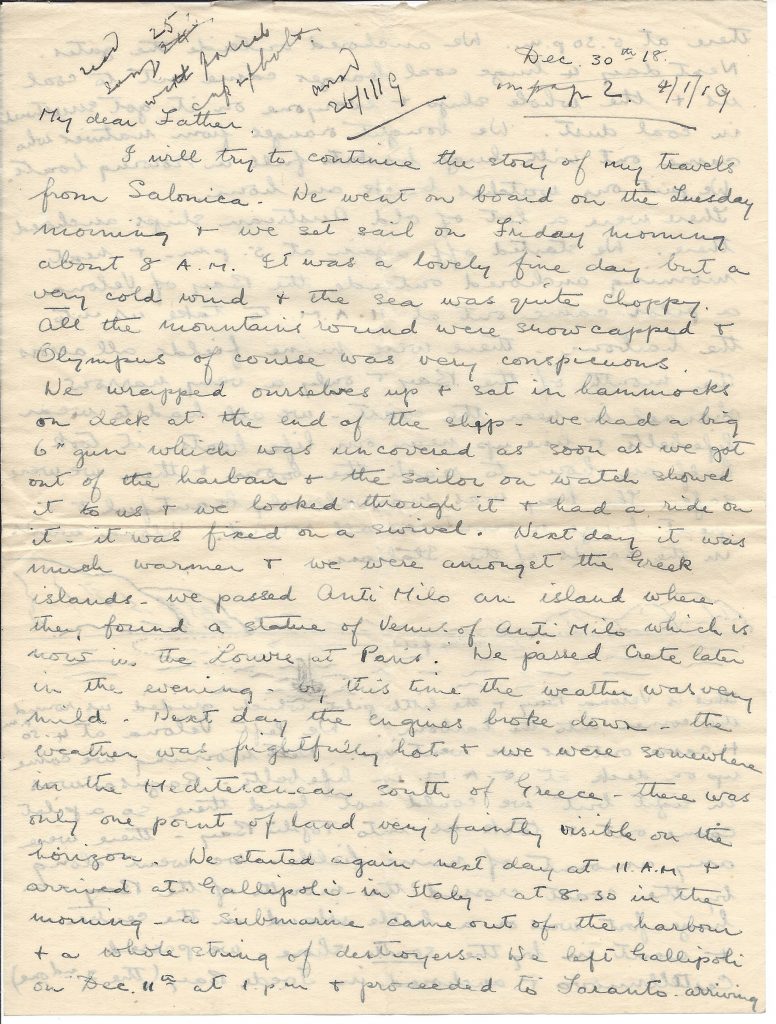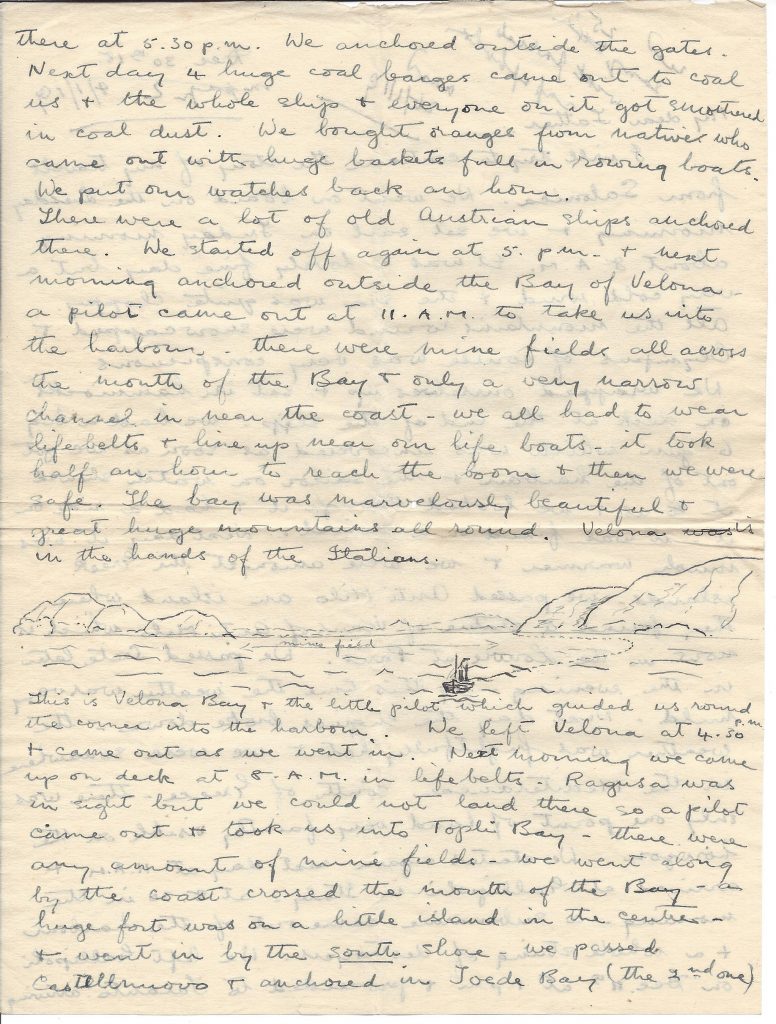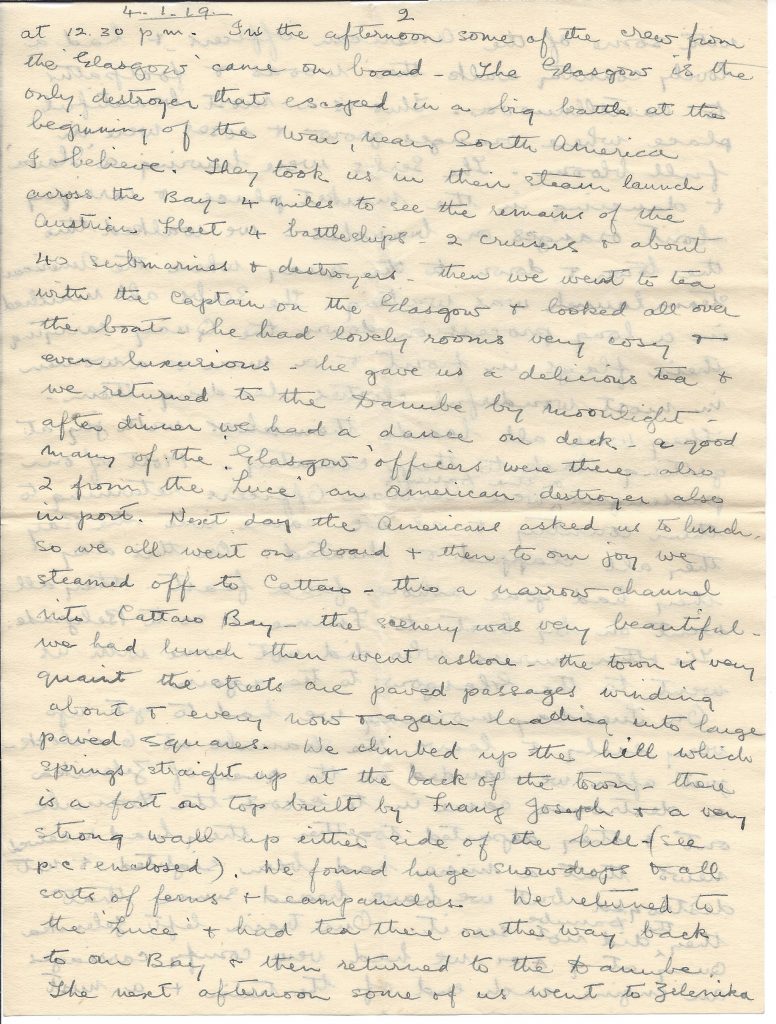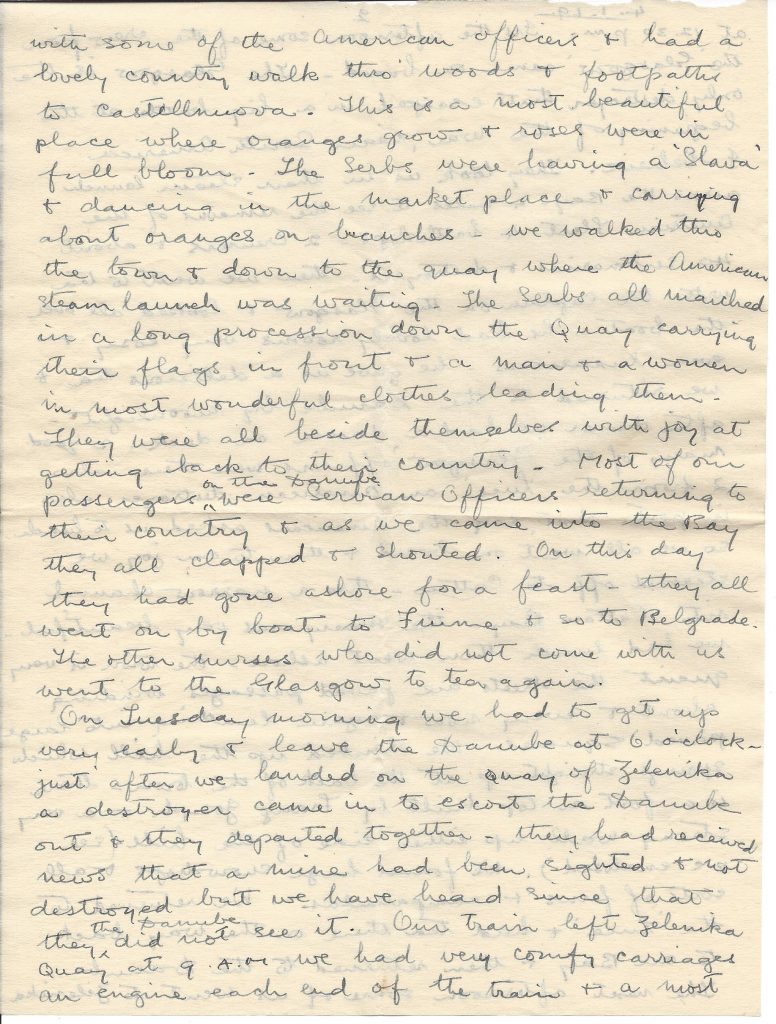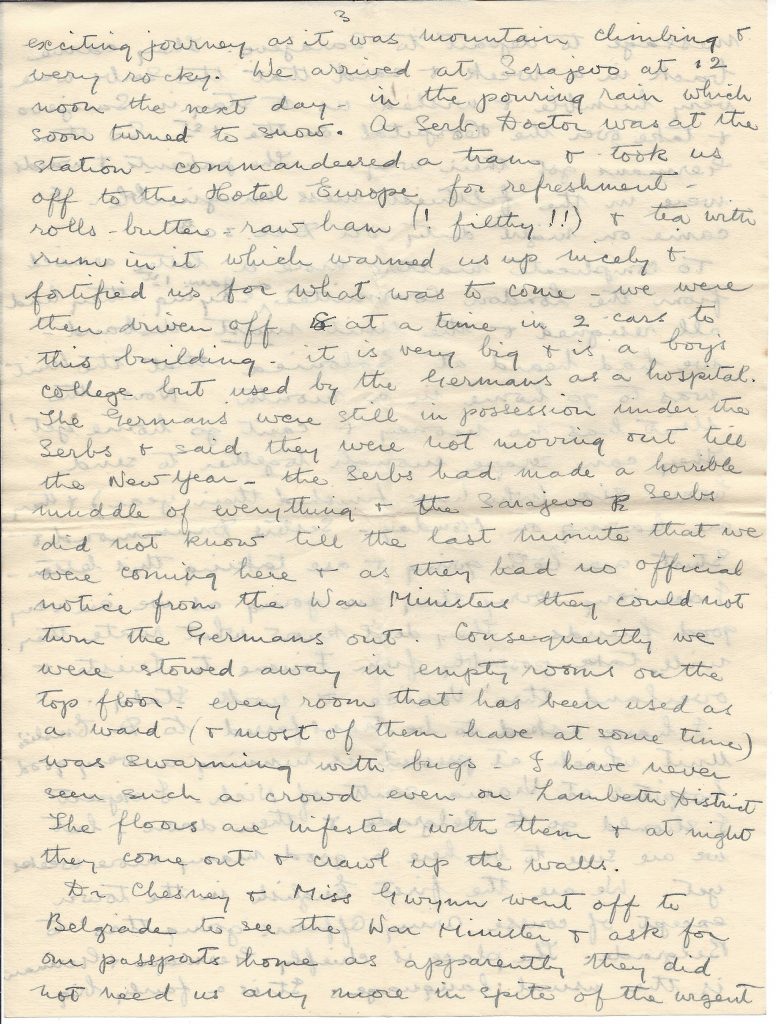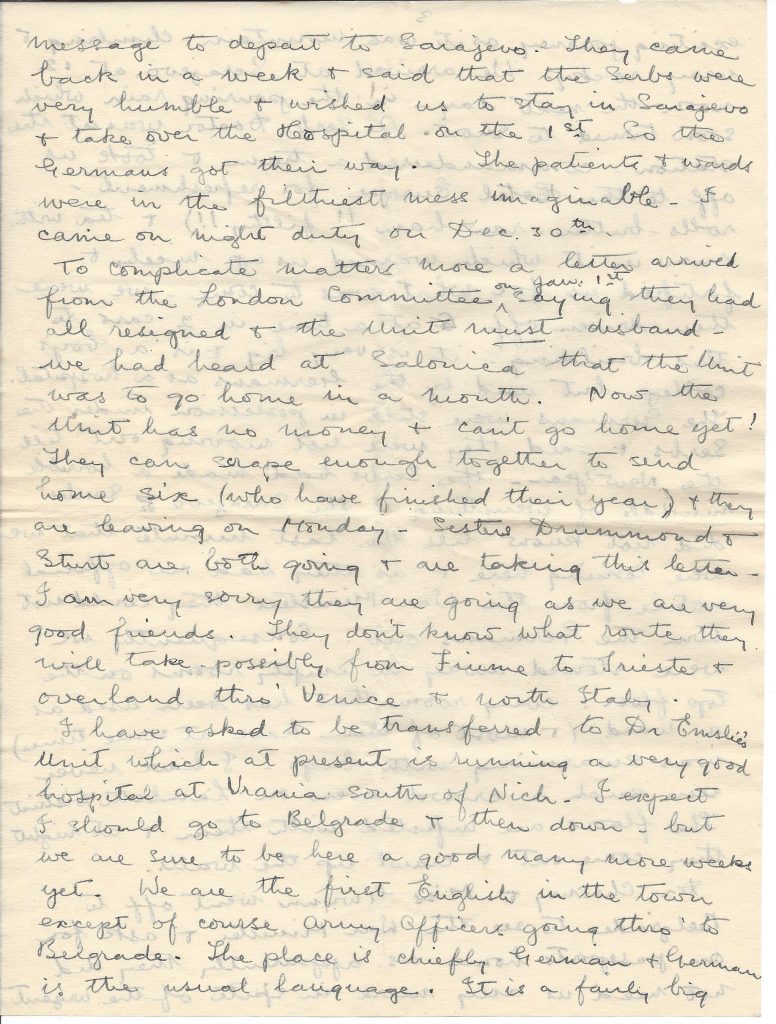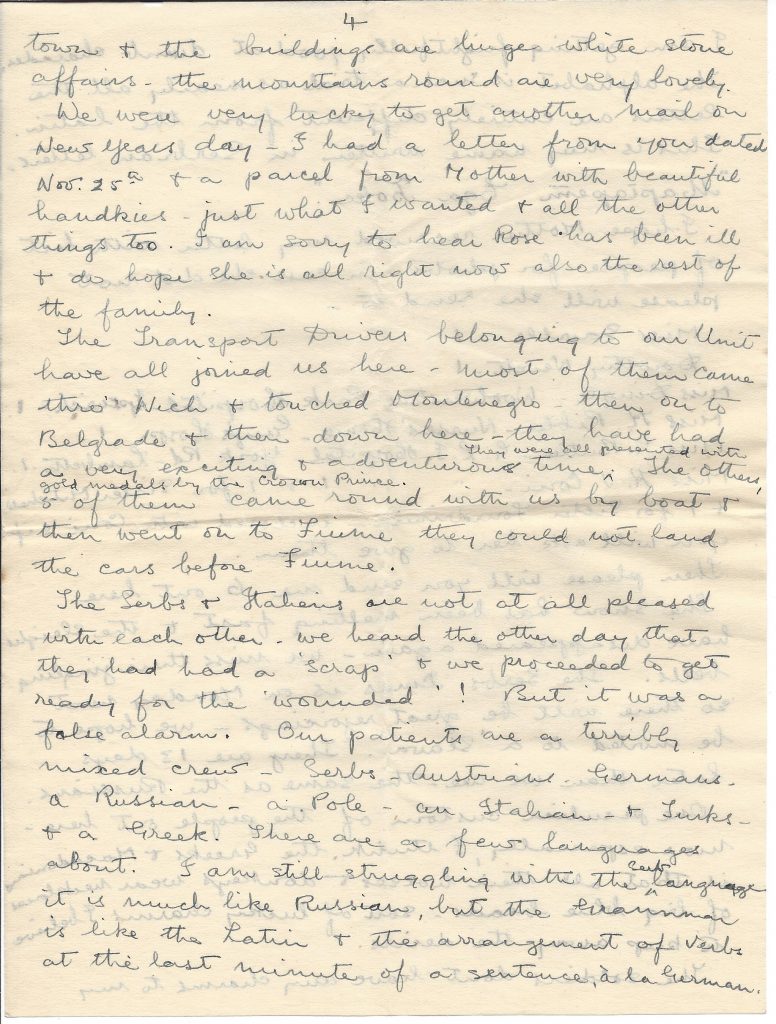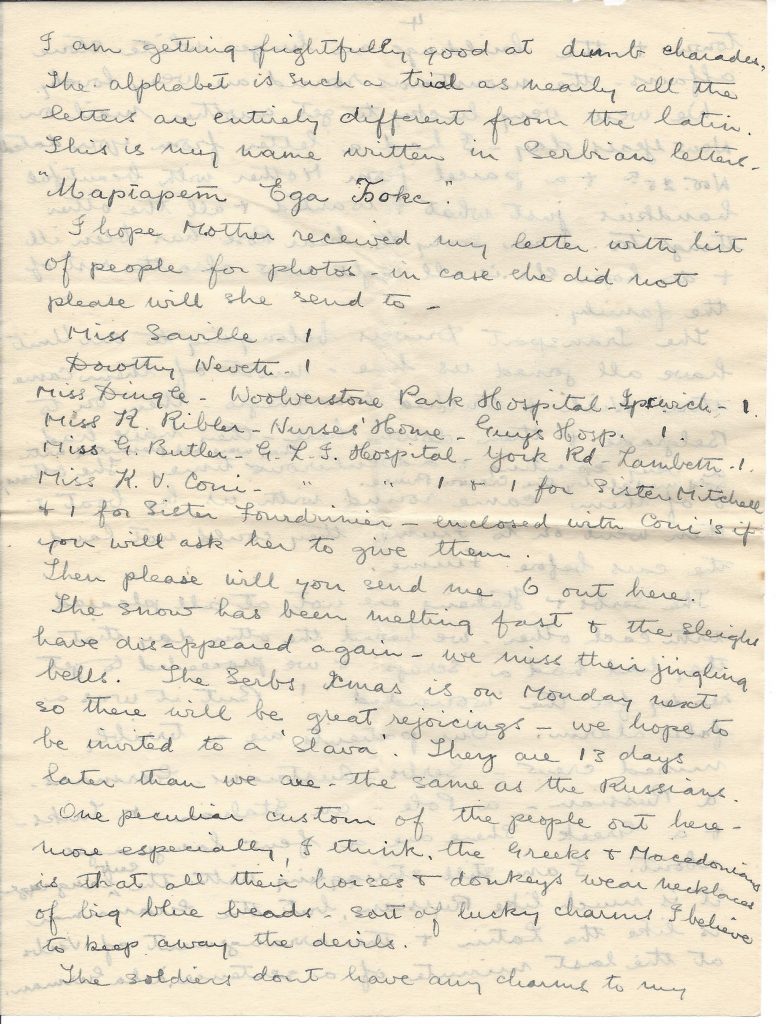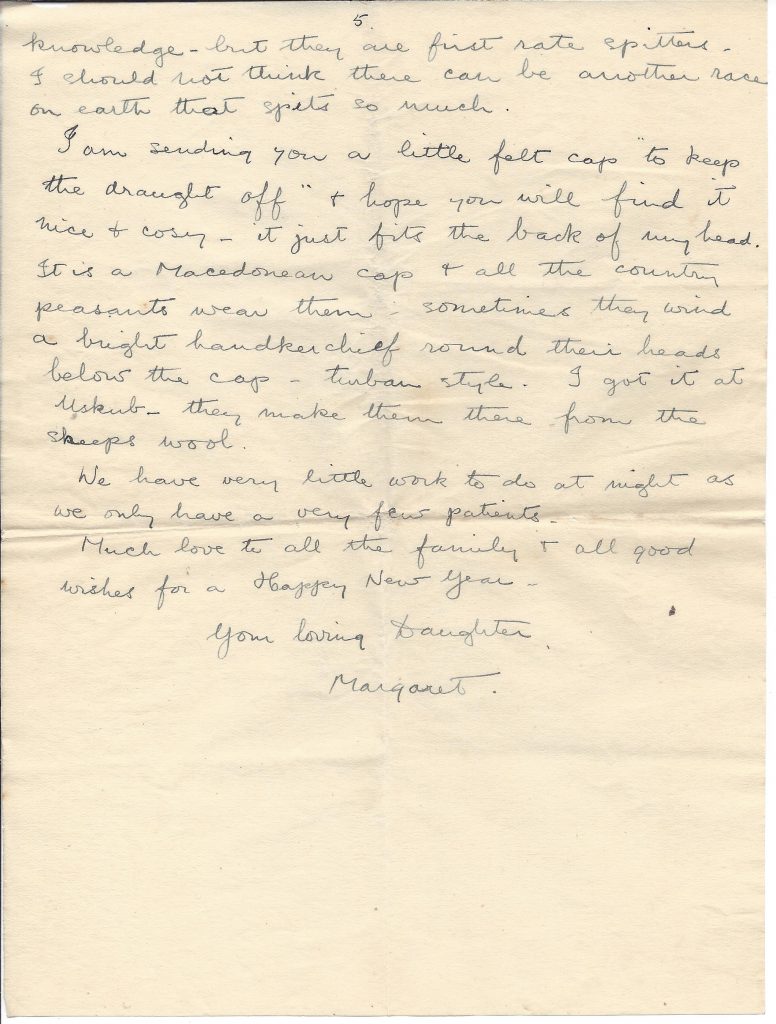My Great Aunt, Margaret Box trained as a nurse and, towards the end of the First World War went as a Red Cross Volunteer with the Scottish Women’s Hospitals to join their life-saving work in Serbia. She had been working in Skopje, but the unit was no longer needed there, and they had been sent, via Salonica to Sarajevo. She wrote this letter on 30th December 1918, telling her Father about her voyage.
This post covers a lot of ground and I plan to revise it to fill in more details, but posting it as a draft.
inprepr 2 4/1/19
My Dear Father,
I will try to continue the story of my travels from Salonica. We went on board on the Sunday morning & we set sail on Sunday morning about 8 A.M. It was a lovely fine day, but a very cold wind & the sea was quite choppy.
All the mountains round were snow capped & Olympus of course was very conspicuous. We wrapped ourselves up & sat in hammocks on deck at the end of the ship. We had a big 6″ gun which was uncovered as soon as we got out of the harbour & the sailor on watch showed it to us & we looked through it & had a ride on it. It was fixed on a swivel. Next day it was much warmer & we were amongst the Greek islands. We passed Anti Milo, an island where they found a statue of Venus of Anti Milo which is now in the Louvre at Paris. We passed Crete later in the morning – by this time the weather was very mild.
Next day the engines broke down. The weather was frightfully hot & we were somewhere in the Mediterranean south of Greece. There was only one point of land very faintly visible on the horizon. We started again next day at 11 A.M. & arrived at Gallipoli in italy at 8:30 in the morning. A submarine came out of the harbour & a whole string of destroyers. We left Gallipoli on Dec 11th at 1 p.m. and proceeded to Taranto arriving there at 5:30 p.m. We anchored outside the gates.
Next day 4 huge coal barges came out to coal us & the whole ship & everyone on it got smothered in coal dust. We bought oranges from natives who came out with huge baskets full in rowing boats. We put our watches back an hour.
There were a lot of old Austrian ships anchored there. We started off again at 5 p.m. & next morning anchored outside the Bay of Velona. A pilot came out at 11 a.m. to take us into the harbour. There were mine fields all across the mouth of the Bay & only a very narrow channel in near the coast. We all had to wear life vests & line up near our life boats. It took half an hour to reach the boom & then we were safe. They bay was marvellously beautiful & great huge mountains all round. Velona was in the hands of the Italians.

This is Velona Bay & the little pilot which guided us round the corner into the harbour. We left Velona at 4.30 p.m. & came out as we went in.
Next morning we came up on deck at 8 A.M. in lifebelts. Ragusa was in sight but we could not land there so a pilot came out and took us to Toplis Bay. There were any amount of mine fields. We went along by the coast crossed the mouth of the Bay – a huge fort was on a little island in the centre & went in by the south shore. We passed Castellnuovo & anchored in Joede Bay (the 2nd one) at 12.30 p.m. In the afternoon some of the crew from the ‘Glasgow’ came on board. The Glasgow is the only destroyer that escaped in a big battle at the beginning of the war, near South America I believe. They took us in their steam launch across the Bay – 4 miles to see the remains of the Austrian fleet, 4 battleships, 2 cruisers & about 40 submarines and destroyers. Then we went to tea with the Captain on the Glasgow & looked all over the boat. He had lovely rooms, very cosy & even luxurious. He gave us a delicious tea & we returned to the Danube by moonlight.
After dinner we had a dance on deck . A good number of the ‘Glasgow’ officers were there, also 2 from the ‘Luce‘ an American destroyer also in port. Next day the Americans asked us to lunch so we all went on board & then to our joy we steamed off to Cattaro, thro a narrow channel into Cattaro Bay. The scenery was very beautiful.
We had lunch then went ashore. The town is very quaint, the streets are paved passages winding about & every now & again leading into large paved squares. We climbed up the hill which springs straight up at the back of the town. There is a fort on top built by Franz Joseph & a very strong wall up either side of the hill (see p.c. enclosed). We found huge snowdrops & all sorts of ferns & campanulas. We returned to the ‘Luce’ & had tea there on the way back to our Bay & then returned to the Danube.
The next afternoon some of us went to Zelenika with some of the American officers & had a lovely country walk thro’ woods & footpaths to Castellnuova. This is a most beautiful place where oranges grow & roses were in full bloom. The Serbs were having a ‘Slava’ & dancing in the market place & carrying about oranges on branches. We walked thro’ the town & down to the quay where the American steam launch was waiting. The Serbs all marched in a long procession down the Quay carrying their flags in front & a man & a woman in most wonderful clothes leading them. They were all beside themselves with joy at getting back to their country. Most of our passengers on the Danube were Serbian Officers returning to their country & as we came into the Bay they all clapped & shouted. On this day they had gone ashore for a feast. They all went on by boat to Fuime & so to Belgrade. The other nurses who did not come with us went to the Glasgow to tea again.
On Tuesday morning we had to get up very early & leave the Danube at 6 o’clock- just after we landed on the quay at Zelenika a destroyer came in to escort the Danube out & they departed together. They had exciting news that a mine had been sighted & not destroyed, but we have heard since that they, the Danube, did not see it. Our train left Zelenika Quay at 9 A.M. We had very comfy carriages, an engine at each end of the train & a most exciting journey as it was mountain climbing & very rocky. We arrived at Sarajevo at 12 noon the next day in the pouring rain which soon turned to snow. A Serb Doctor was at the station, commandeered a tram & took us off to the Hotel Europe for refreshment, rolls, butter, raw ham (! filthy !!) & tea with rum in it which warmed us up nicely & fortified us for what was to come. We were then driven off 8 at a time in 2 cars to this building. It is very big & is a boys college but used by the Germans as a hospital.
The Germans were still in possession under the Serbs & said that they were not moving out till the New Year. The Serbs had made a horrible muddle of everything & the Sarajevo Serbs did not know till the last minute that we were coming here & as they had no official notice from the War Minister they could not turn the Germans out. Consequently we were stowed away in empty rooms on the top floor. Every room that had been used as a ward (& most of them had at some time) was swarming with bugs. I have never seen such a crowd even on Lambeth District. The floors are infected with them & at night they come out & crawl up the walls.
Dr Chesney & Miss Gwynn went off to Belgrade to see the War Minister & ask for our passports home as apparently they did not need us any more in spite of the urgent message to depart to Sarajevo. They came back in a week & said that the Serbs were very humble & wished us to stay in Sarajevo & take over the Hospital on the 1st. So the Germans got their way. The patients & wards were in the filthiest mess imaginable. I came on night duty on Dec 30th.
To complicate matters more a letter arrived from the London Committee on Jan 1st saying that they had all resigned & the Unit must disband. We had heard at Salonica that the Unit was to go home in a month. Now the Unit has no money & can’t go home yet!
They can scrape enough together to send home six (who have finished their year) & they are leaving on Monday. Sisters Drummond & Stuart are both going & are taking this letter.
I am very sorry they are going as we are very good friends. They don’t know what route they will take, possibly from Fiume to Trieste & overland thro’ Venice & north Italy.
I have asked to be transferred to Dr Emslie’s Unit which at present is running a very good hospital at Vrania south of Nick. I expect I should go to Belgrade & then down, but we are sure to be here a good many more weeks yet. We are the first English in the town, except of course Army Officers going thro’ to Belgrade. The place is chiefly German & German is the usual language. It is a fairly big town & the buildings are huge white stone affairs. The mountains round are very lovely.
We were very lucky to get another mail on New Year’s day. I had a letter from you dated Nov 25th & a parcel from Mother with beautiful handkies, just what I wanted & all the other things too. I am sorry to hear Rose has been ill & do hope that she is all right now also the rest of the family.
The Transport Drivers belonging to our Unit have all joined use here. Most of them came thro’ Nick & touched Montenegro, then on to Belgrade & then down here. They have had a very exciting & adventurous time. They were all presented with gold medals by the Crown Prince. The others, 5 of them, came round with us by boat & then went on to Fiume. They could not land the cars before Fiume.
The Serbs & Italians are not at all pleased with each other. We heard the other day that they had had a ‘scrap’ & we proceeded to get read for the ‘wounded’! But it was a false alarm. Our patients are a terribly mixed crew – Serbs, Australians, Germans, a Russian, a Pole, an Italian & Turks & a Greek. There are a few languages about. I am still struggling with the Serb language. It is much like Russian but the Grammar is like the Latin & the arrangement of verbs at the last minute of a sentence a la German.
I am getting frightfully good at dumb charades. The alphabet is such a trial as nearly all the letters are entirely different from the latin. This is my name written in Serbian letters.

I hope Mother received my letter with list of people for photos. In case she did not please will she send to –
Miss Saville – 1
Dorothy Nevett – 1
Miss Dingle – Woolverstone Park Hospital, Ipswich – 1
Miss H Ribler – Nurses’ Home, Guy’s Hosp. 1
Miss G. Butler – G.L.I. Hospital, York Rd. Lambeth – 1
Miss K.V. Coni – ” ” ” 1 & 1 for Sister Mitchell & 1 for Sister Fourdrinian – enclosed Coni’s if you will ask her to give them.
Then please will you send me 6 our here.
The snow has been melting fast & the sleighs have disappeared again – we miss their jingling bells. The Serbs Xmas is on Monday next so there will be great rejoicings. We hope to be invited to a ‘Slava’. They are 13 days later than we are, the same as the Russians.
One peculiar custom of the people out here, more especially, I think, the Greeks & Macedonians is that all their horses and donkeys wear necklaces of big blue beads – sort of lucky charms I believe to keep away the devils.
The soldiers don’t have any ?diaums to my knowledge, but they are first rate spitters. I should not think that there can be another race on earth that spits so much.
I am sending you a little felt cap “to keep the draught off” & hope you will find it nice & cosy – it just fits the back of my head. It is a Macedonian cap & all the country peasants wear them, sometimes they wind a bright handkerchief round their heads below the cap, turban style. I got it at Uskub, they make them there from the sheeps wool.
We have had very little work to to at night as we only have a very few patients.
Much love to all the family & all good wishes for a Happy New Year.
Your loving Daughter
Margaret
Notes
Postcard Recipients
Miss Saville
There are several Miss Savilles show at https://vad.redcross.org.uk/Search?sname=Saville though not all are Miss
Dorothy Nevett
She is not in the Red Cross list, and may have been a non-nursing friend.
Miss Dingle
She was Janet Dingle, Matron at the Wolverstone Park Hospital – this site has much interesting information about the Hospital, and British Home Hospitals in general, including information about Janet Dingle, and a link to her Red Cross Card.
Timeline and map of the journey
Although in her letter of December 2nd, Margaret expects to be setting off the next day, (Wednesday 4th, as her letter continues to be written on the 3rd), the Danube does not leave Salonica until December 6th. These bits of timeline are taken partly from the letters and partly from her diary – I will revisit this to fill them in better.
Tuesday 3rd December
8 am. Board the Danube, but do not sent sail
Wednesday 4th December
Went on land, had lunch at Red Corss
Thursday 5th December
Had a Serbian lesson, and swarms of people came on board.
Friday 6th December
Set sail from Saloncia at 8.30 am, view the guns. Pass Mount Olympus
Saturday 7th December
Pass Anti Milo or possibly Milos as the island the Venus de Milos was discovered on, and Crete, later that morning.
Sunday 8th December
Engines Break down
Monday 9th December
Engines start again and then break down again
Tuesday 10th December
Arrive at Gallipoli
Wednesday 11th December
Leave Gallipoli at 1 p.m.
Thursday 12th
See Austrian boats, Guided past the mines
Friday 13th
Anchor off Bay of Velona
Saturday 14th
Enter Teode bay. On Glasgow in the evening
Sunday 15th
Lunch with Americans on Luce
Monday 16th
Walk to Castlenuova, Serbs having a Slava
Tuesday 17th
Ashore on Glasgow’s launch, then on the train through Ragusa, Mostar
Wednesday 18th
On train, through Podoratec, Rastelisa, Pagaire, arrive at Sarajevo at 12 noon
